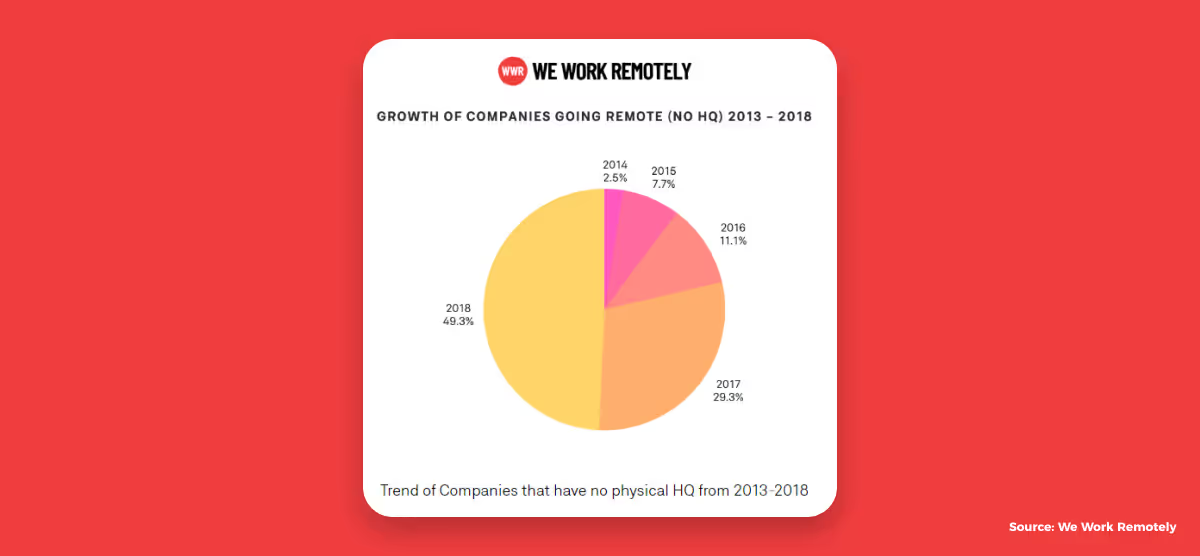The virus has triggered the work from home movement and nowadays remote work is indispensably gaining acceptance worldwide. But is it here to stay? With many businesses now reaping the benefits of working from home, could businesses use this as an opportunity to adapt and change for good?Before moving on to the late-breaking work from home trends, let’s briefly dwell on some frequently asked questions about what remote work is and how remote work has evolved in the past years before the pandemic crisis.
FAQ about remote work
What was remote work then and what is it now?
Remote work simply corresponds to any work that can be handled without needing to commute to a physical office. Either full time or one to two days a week, people all around the world had been practicing one form of remote work in their jobs before the Covid-19 outbreak.Whether as a contracted employee of an organization or as a self-employed professional, many individuals work on a remote basis at different frequencies. Today, with limited access to the outer world due to Coronavirus, remote work is not only a non-traditional working alternative but rather the norm.
How does remote work differ from telecommuting?
It is hard to make a distinction. While until recently, telecommuting was seen as identical to remote work and two concepts were used almost interchangeably, it is easy to realize that the term “telecommuting” is not as trendy as it used to be.Telecommuting suggests that the work may be done at the headquarters in some part. Therefore, it can at times be identified as an occasional version of remote work. Another feature of telecommuting is the fact that there is a base or a site for work, whereas the communication for the work can be carried out through internet-related media.Remote work on the other hand does not require a physical headquarter. Generally you either work for yourself or a remote company (like us at Ruul). You can be based anywhere in the world, whereas if you are a telecommuter, it is highly likely that you are based in the same geographical area with occasional visits to your workplace for purposes such as meetings, taxation, and etc.Data from We Work Remotely, the largest remote work community in the world shows that growth of companies without physical headquarters has risen from 2.5% (2014) to 49.3% (2018), therefore, it would not be improper to derive from these statistics that the numbers of remote workers have been on a significant rise in the last decade.

Is remote work the same as work from home?
Not necessarily, unless there is a restricting situation such as a pandemic! Although data from Squaretalk's Remote Work Statistics in 2022 report suggests that the majority of remote workers have been primarily working from home, in essence remote work means working from anywhere.
How about freelancers? Where do they fall in this scene?
Freelancers are mostly remote workers, but they can be hired for on-site, project-based work, too. It is their area of expertise and type of services they offer that determines where they work, rather than their employment type. While freelancers may serve several clients simultaneously as self-employed entities, remote workers may rather have fixed and dedicated work terms in an employer-employee affiliation.
What are the benefits of working remotely?
Time is in your hands
Remote work lets you focus on work whenever convenient for you. As long as you achieve your task, how much time you will spend on it is totally up to you.
Higher quality of life and better work-life balance
According to the Remote Collaborative Worker Survey by CoSo, a significant portion of remote workers eat healthier, sleep better, get more exercise, have lower stress and have more time to spend with their loved ones. Lowered risk of burnout means better mental health.
A more diverse working and learning environment
Being a member of a remote team usually means you are working and continuously collaborating with a culturally diverse group of people. Diversity is a quality that brings in new perspectives, teachings, best practices, and understandings of work ethics.
What are the pros of remote work for the employer?
Higher efficiency and success
With happier and healthier employees, companies enjoy the benefits of higher productivity. Clearing the day off the necessity to commute, employees actually have more time to allocate for work.
Becoming attractive for the emerging workforce
Not surprisingly, the workforce is now composed of different types of workers. Young talents are out there and their familiarity with the technology enabling working online is a huge barrier for persistent companies. With freelancing or entrepreneurship as the top priority in the minds of this young talent pool, employers adapting to the new world order would be able to convert this population to their staff.
Decreased costs
Remote work or working from home reduces the expenses. With a more satisfied and committed staff, employers see a reduced employee turnover and thus have to deal with lower costs for onboarding. In addition, the more work is carried out elsewhere, the less office space, supplies, and technical equipment is needed.
Stronger trust among employees
Being distant from the coworkers comes with the acknowledgment that everyone is responsible for themselves. Yet, it also boosts collaboration and cooperation, since being on the same page matters. With clear work descriptions and time schedules, employees feel more empowered both personally and as a team.
The future of working from home

Shift in organizational habits
With the benefits of remote work and the compulsive factor of the Coronavirus, it seems that remote work will give both employees and employers a chance to reevaluate the habitual organizational culture. We have an opportunity to discover new ways of collaboration, communication, and improvement at this time of crisis.This period can be put to use to restructure the working processes. By attending to the new potentials and needs of the workforce, businesses can rebuild or strengthen trust among their employees and break away from micromanaging.
Twist in the intentions
With the virus acting as a catalyst and business operations virtualizing at this pace, we already observe massive changes that may eventually shift into new fundamental corporate habits. We see companies thriving for a good cause not as part of a social responsibility campaign, but with the sole purpose of contributing to humanity. It sure is a time that brings forth the values and leadership potentials, as well as the resilience of businesses.
Change in the perspective
In the long run, many organizations may come to realize how cost-effective and efficient remote work is. Perhaps new work policies and procedures accommodating remote work permanently will become the norm and thus, companies will discover the agility of a skilled and remote global workforce.The change will not come abruptly and there will be challenges. Rosabeth Moss Kanterhas recently pointed out the need to “think outside the building” and in order to accomplish this, companies should reinstate good workplace practices that contribute to productivity and well-being.Not all jobs can be fully and easily shifted to a remote arrangement. Production lines require manual human labor and in some areas such as banking and military, there are concerns of security.However, Covid-19 has definitely taught us that many jobs can in fact be sustained remotely. Needless to say, it seems that HR departments will encounter the question of whether their job offer can be performed off-site more frequently.









